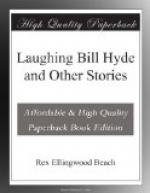With an effort he dismissed the subject from his mind and set himself to the more pleasant task of looking at his play through the eyes of the reviewers.
They had been very fair, he decided at last. Their only criticism was one which he had known to be inevitable, therefore he felt no resentment.
“Norma Berwynd was superb,” he read; “she combined with rare beauty a personality at once bewitching and natural. She gave life to her lines; she was deep, intense, true; she rose to her emotional heights in a burst of power which electrified the audience. We cannot but wonder why such an artist has remained so long undiscovered.”
The dramatist smiled; surely that was sufficient praise to compensate him for the miserable experience he had just undergone. He read further:
“Alas, that the same kind things cannot be said of Irving Francis, whose name is blazoned forth in letters of fire above the theater. He has established himself as one of America’s brightest stars; but the role of John Danton does not enhance his reputation. In his lighter scenes he was delightful, but his emotional moments did not ring true. In the white-hot climax of the third act, for instance, which is the big scene of the play, he was stiff, unnatural, unconvincing. Either he saw Miss Berwynd taking the honors of stardom away from him and generously submerged his own talent in order to enhance her triumph, or it is but another proof of the statement that husband and wife do not make convincing lovers in the realm of the make-believe. It was surely due to no lack of opportunity on his part—”
So the writer thought Irving Francis had voluntarily allowed his wife to rival him. Phillips smiled at this. Some actors might be capable of such generosity, but hardly Irving Francis. He recalled the man’s insistent demands during rehearsals that the ’script be changed to build up his own part and undermine that of his wife; the many heated arguments which had even threatened to prevent the final performance of the piece. Irving’s egotism had blinded him to the true result of these quarrels, for although he had been given more lines, more scenes, Phillips had seen to it that Norma was the one to really profit by the changes. Author and star had been upon the verge of rupture more than once during that heartbreaking period of preparation, but Phillips was supremely glad now that he had held himself in control. Leontine’s constant nagging had borne fruit, after all, in that it had at least taught him to bite down on his words, and to smile at provocation.
Yes! Norma Berwynd was a star in spite of herself, in spite of her husband. She was no longer merely the wife of Irving Francis, the popular idol. Phillips was glad that she did not know how long it had taken him to effect her independence, nor the price he had paid for it, since, under the circumstances, the truth could help neither of them.
He was aroused from his abstraction by the rustle of a woman’s garments, and leaped to his feet with a glad light in his eyes, only to find Leontine, his wife, confronting him.




